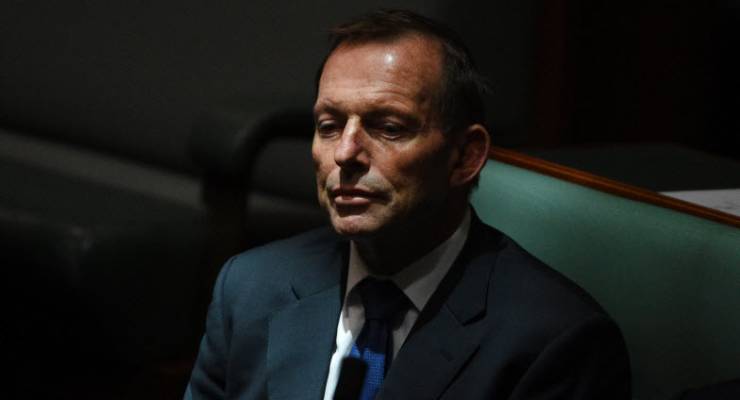
Whatever the flaws of Malcolm Turnbull and his government, the incessant baiting and sniping of Tony Abbott, like the relentless destabilisation of Kevin Rudd against Julia Gillard, is profoundly unhelpful to the task of getting on with governing the nation. In contrast to Rudd, of course, Abbott does his destabilisation in full view of the public rather than behind the scenes. Moreover, he does it on policy, whereas Rudd in exile rarely gave anything more than opportunistic consideration to policy. Problem is, in doing so, Abbott reveals how little grasp he has of policy, or even of basic facts.
Take his argument on the weekend recycling a proposal 14 years ago from John Howard to make it easier for governments to force through bills rejected by the Senate (Abbott airbrushes out that Howard suggested two different proposals, one of them based on an idea from Labor’s Michael Lavarch). Howard was being profoundly hypocritical in trying to curb the powers of the Senate — a fact that John Faulkner skewered with forensic accuracy at the time; as Faulkner noted, “it seems constitutional reform is only desirable when the Liberals are in government”.
But Abbott argues that this is a solution to “gridlock between the two houses of parliament”. Abbott, of course, was notoriously unable to negotiate the passage of his bills through the Senate. In contrast, Julia Gillard was able to negotiate bills through both the House of Representatives, where conservative independents and Andrew Wilkie held the balance of power, and the Senate. Indeed, Howard himself managed to get some of the most important legislation of recent decades, including major industrial relations reforms and the GST, through a reluctant Senate. Abbott tries to cover himself on this front by saying that it “doesn’t matter much for Labor governments that want higher spending, more regulation and heavier taxes (at least on the so-called rich); but it matters a great deal for Liberal National governments that want less spending, fewer regulations and lighter taxes (on the people who create wealth and jobs).”
Well, let’s put that to the test. In Labor’s last full fiscal year, 2012-13, spending was 24% of GDP, according to 2016 Mid Year Economic and Fiscal Outlook data. Under Abbott, spending immediately rose to 25.6% of GDP and remained at that level throughout his short and disastrous prime ministership. And while it partly relies on some very convenient revisions to demand-driven programs, Treasurer Scott Morrison has, since Abbott’s ouster, got spending down to 25.2% of GDP — still well above the level inherited from Labor but much better than Abbott. As for heavier taxes, Abbott is completely delusional. The tax burden in Labor’s last year was 21.4% of GDP — the highest since 2008-09. When Abbott was dumped it had reached 21.9% of GDP — and that’s despite Abbott securing the agreement of the Senate to dump the mining tax and carbon price, which curiously the Senate was prepared to do despite its alleged preference for higher taxes. That 21.9% was the highest since the Howard years, when Peter Costello was slugging taxpayers 23-24% of GDP.
Then there was his other effort to undermine the government, attacking the Renewable Energy Target again and lauding “clean coal and gas”. “The past year has shown us what happens when mainstream parties lose touch with their supporters,” he warned. Again, let’s put that to the test: Abbott was third behind Turnbull and Julie Bishop as leader of his party in November among Coalition voters (he was fourth, behind “Someone else”, among all voters). Presumably, then, he should rule out any return to the leadership, given how out of touch that would be with Coalition voters. And, by the way, how do Coalition voters feel about renewable energy? In 2014, Coalition voters were indistinguishable from Labor voters in supporting the then-current Renewable Energy Target (which Abbott then reduced); in 2015, over 60% of Coalition voters thought the RET was about right or “too low”. Coalition voters also support Labor’s proposal for a 50% RET by 2030. And despite constant Turnbull government scaremongering, over half of Coalition voters agree that renewable energy is “the solution to our energy needs.”
If Abbott wants to make being in touch with party supporters his guide, he should support his Prime Minister and back more renewable energy.








Well you see, it is all he can do and all he has ever been able to do. He is playing to his strengths. The man is a clown and always has been, unfortunately he was promoted well above his ability and no one kept an eye on him.
If only we had a “Departure From the Truth Tax”?
Whenever I read of Tony Abbott’s ‘helpful’ intercessions, I wonder if Malcolm I echoes in his prayers the words of Henry II (in relation to Thomas a Becket): “Will no one rid me of this troublesome priest?”
David Hough
Wembley Downs.
Whenever I see a photo of a pensive/reflective tolan these days, I can’t help but hear the opening bars of REM’s ‘losing my religion’ in my head.
The tax burden in Labor’s last year was 21.4% of GDP — the highest since 2008-09.
Shouldn’t that read ” – the highest LABOR TAX BURDEN since 2008-09 ?